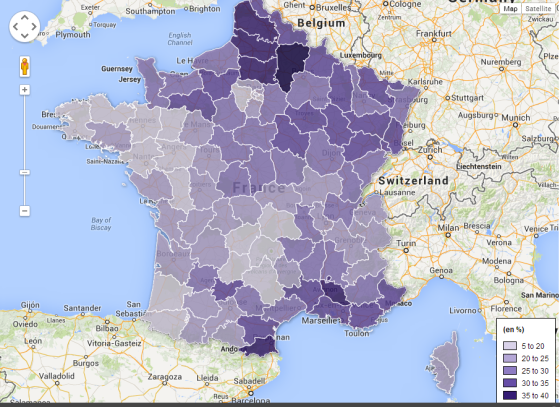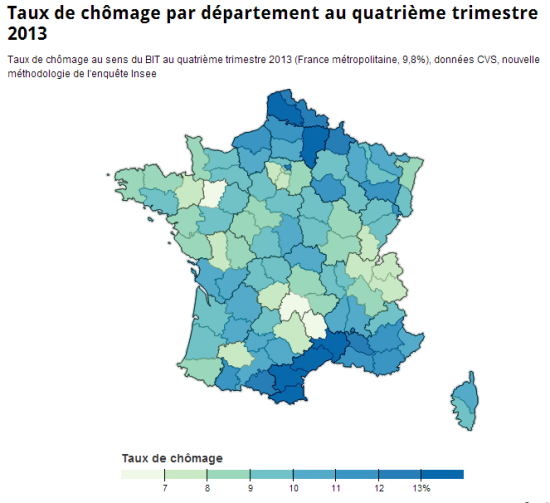
The increase in popularity of Marine Le Pen’s Front National
Front National is often stigmatized as fascist by the media, because of their somewhat radical political ideas. Front National’s current leader Marine Le Pen is believed to have distanced herself from the party’s neo-fascist past. However, according to Mammone (2015), these allegedly modern, non-extremist, far right parties such as Front National, are in some ways even more worrying than the old neo-fascists led by the likes of Jean-Marie Le Pen, especially when taking the current economic situation, the unpopularity of the EU, their own international networks and the recent links with Russia into account. However, there is no doubt that since the rise of Marine Le Pen as the new leader of Front National, the party has had an increase in popularity. Is this only the work of Marine Le Pen, or are there other contributing factors though?
Electoral successes of Front National
Since Marine Le Pen took over the presidency of Front National from her father in 2011, she pursued a plan to expand the party’s base. Her tactics to do this are emphasizing economic themes, trying to recruit more credible candidates and focusing on local elections and winning a greater representation in the European Parliament (Rubin, 2014). Her tactics seem to work, since provisional results showed that Front National set to take control of 11 towns across the country at the 2014 municipal elections of France. These results were a new record for Front National and easily beat the old record, which was set in the 1990’s, when Front National only ruled in four towns (Willsher, 2014).
The failure of the former president Hollande, in matters such as the high unemployment rate, made sure that a lot of people in France were sick of the situation and wanted to have a drastic change in politics.
As stated by Willsher (2014), voters wanted to punish president Hollande, who was president of France from May 15th 2012 until May 14th 2017, for his failure to turn around the Eurozone’s second largest economy and, more importantly, for his failure to tackle France's unemployment rate of more than 10%. This caused at least 140 more towns to swing from the left to mainstream opposition conservatives. The most of Front National’s successes were in the east and west of the country, in areas with high unemployment and immigration rates. The moderation of Front National's image after Marine Le Pen took control, as well as her positioning the party as being anti-immigrant and anti-Muslim, as well as the tackling of economic insecurity being one of its main points and communicating a general disgust with the political establishment have helped Marine Le Pen gain more voters and set a new record in the municipal election results.
The elections for the European Parliament of 2014 and the successes of Front National that came along with them were even more important. These elections took place only two months after the municipal elections in France. Front National received 24.9% of French votes in the elections for the European Parliament during 20th – 25th May 2014. With this amount of votes, Front National became the largest French party in the European Parliament, with 24 seats (Page, 2014). The table below provides an overview of the results per region. The results of the first, second and third winning parties are included in the table:

Figure 1, [Overview of the results of the 2014 French European Parliament elections]. Reprinted from “France’s Front National”, R. Page, 2014, International affairs and defence section.
As can be seen from the table above, Front National gained the most votes in almost every region of the country. Front National only performed poorly in Ile-de-France and the Overseas Territories. This success can be, yet again, led back to the failing of the government. According to Haski (2014), many French voters have concluded that the main political parties have failed, because of the economic and social crisis, with more than three million people unemployed and no concrete sign of aid. Front National has won the European Parliament elections with simplistic ideas. Ideas that are all radically different from the mainstream parties that tried, but still failed to solve society's most pressing issues with “reasonable” policies. The map in figure 2 shows the voting percentage per region for Front National; the darker the shade, the higher the percentage of votes. Figure 3 also shows a map of France, now featuring the unemployment percentage per region.

Figure 2, European Parl FN vote in 2014 election. Reprinted from Prime Economics, by J. Smith, 2014

Figure 3, Unemployment by department Q4 2013. Reprinted from Prime Economics, by J. Smith, 2014
Looking at both figures, we can indeed see a strong correlation between the regions that voted in favour of Marine Le Pen’s Front National in the 2014 European Parliament elections, and the regions with a high unemployment rate.
Xenophobia
On the 23rd of April, 2017, French citizens cast their vote in the first round of the country’s presidential elections. Emmannuel Macron, the current president of France, came out as first, acquiring 24% of the votes. Marine Le Pencame in as second, with 22% of the votes (Martin, 2017). A reason for these high percentages is that more and more millennials are supporting Front National. Millennials say that the recent terrorist attacks in France, referring to the 14th of July, 2016 in Nice and 13th of November, 2015 in Paris, and various attacks across Europe, validate their personal views, as well as the anti-immigration stance of the party.
Xenophobia is one of the main reasons for the increase in popularity of Front National.
Critics say Marine Le Pen’s platform is nourished by fear and xenophobia (Chadwick, 2016). Front National’s support among young voters has grown substantially. In the first round of the presidential election in 2007, Front National obtained just 6% of the votes of 18-24 year olds, and in 2012 this had grown to 18% (Obs, 2012). Three years later, in the regional elections, 34% of 18-24 year olds voted for Front National (Anonymous, 2015).
According to Martin (2017), a key part of understanding the support Front National receives from youths are the challenges that the young generation in France faces, in particular economic and social problems. Moreover, Marine Le Pen speaks in a very nationalistic and anti-universal way and preaches for inequality. This helps her portray herself and her party as fighting for French sovereignty against a European Union that is becoming increasingly controlling. Le Pen seems to care more for the French people, than for the immigrants. Therefore, youths who feel insecure and want to see things change now that France has suffered several terrorist attacks can see Marine Le Pen as their ideal leader.
Explaining the success of Front National
Since Marine Le Pen took over the presidency of Front National from her father, she has portrayed a new, deradicalized image of her party. She's done this to attract more supporters and to break away from the party's neo-fascist past. This new approach seems to have worked, because since Marine Le Pen's presidency, Front National has had some important electoral victories, new electoral records and an increase in supporters. However, these successes are not all due to Marine Le Pen. While Marine Le Pen portrays a new image and makes use of messages such as: “Au nom du peuple”, which translates to “In the name of the people”, to attract more voters and supporters, there are other contributing factors explaining the newly gained popularity of her Front National.
The failure of the former president Hollande, in matters such as the high unemployment rate, made sure that a lot of people in France were sick of the situation and wanted to have a drastic change in politics. Marine Le Pen made Front National less fascist, and therefore more accessible for the average person, while still maintaining the party's core foundation of radical politics and simplistic ideas. The electoral successes of Front National can therefore not just be attributed to the new image Marine Le Pen has given the party; they can also be led back to the failure of the government, which made people want a drastic and radical change in politics. People who've voted Front National feel that this party can bring about this change better than the left wing parties.
Moreover, xenophobia is also a reason for the increase in popularity of Front National. Recent terrorist attacks were a reason for a lot of young French citizens to vote for Marine Le Pen and her party. Her anti-Enlightment ideology, which includes an anti-immigrant stance, helped her gain support from French youths, who want to drastically change French politics regarding these issues.
While Marine Le Pen softened her party’s image and turned her back on the party’s neo-fascist past, in order to gain more support, there were other contributing factors helping Front National in their increase in popularity. The unemployment rate and the recent terrorist attacks are the most important factors. People who vote for Front National want drastic changes in France regarding these matters, as they feel other political parties have failed them.
References
Anonymous (2015) Régionales 2015: 34% des jeunes ont vote Front national. 20Minutes.
Chadwick, L. (2016) France’s National Front Finds Support Among Millennials. NBC News.
Haski, P. (2014) The front National’s vitory reflects a failure of France’s elite. The Guardian.
Mammone, A. (2015) Don’t be fooled by ‘moderate’ Marine Le Pen. Front National’s more toxic than ever. The Guardian.
Martin, V. (2017) France’s Front National and millennials: when insecurity and fear meet social media. The Conversation.
Obs (2012) Ces jeunes qui ont rejoint le Front national. L’OBS.
Page, R. (2014) France’s Front National (FN). Section International affairs and Defence Section.
Rubin, A. (2014) National Front Wins Support and Elections. NY Times.
Smith, J. (2014) Mapping France – the link between unemployment, GDP and voting Front National.
Willsher, K. (2014) French Socialists suffer as far-right and conservatives sweep elections. The Guardian.